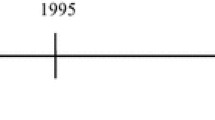Abstract
What Do the Data Tell Us? Justification of scientific theories is a three-place relation between data, theories, and background knowledge. Though this should be a commonplace, many methodologies in science neglect it. The article will elucidate the significance and function of our background knowledge in epistemic justification and their consequences for different scientific methodologies. It is argued that there is no simple and at the same time acceptable statistical algorithm that justifies a given theory merely on the basis of certain data. And even if we think to know the probability of a theory, that does not decide whether we should accept it or not.
Similar content being viewed by others
LITERATUR
Bartelborth, T.: 1993, 'Hierarchy Versus Holism. A Structuralist View on General Relativity', Erkenntnis 39, 383–412.
Bartelborth, T.: 1996, 'Begründungsstrategien. Ein Weg durch die analytische Erkenntnistheorie, Akademie Verlag, Berlin.
Bartelborth, T.: 2001, 'Abduktion und Verstehen', in Thomas Rentsch (Hg.), Sprache, Erkenntnis, Verstehen. Grundfragen der theoretischen Philosophie der Gegenwart, Dresden, 77–102.
Bartelborth, T.: 2002, 'Explanatory Unification', Synthese 130, 91–207.
Beck-Bornholdt, H.-P. and Dubben, H.-H.: 1998, Der Hund, der Eier legt. Erkennen von Fehlinformationen durch Querdenken, rororo.
Berk, R. A. and Freedman, D. A.:2001, 'Statistical Assumptions as Empirical Commitments', in T.G. Blomberg and S. Cohen (eds), Law, Punishment, and Social Control: Essays in Honor of Sheldon Messinger, 2nd ed. de Gruyter, NewYork, to appear.
BonJour, L.: 1985, The Structure of Empirical Knowledge, Harvard University Press.
Chalmers, A. F.: 2001, Wege der Wissenschaft, Springer Verlag, Berlin.
Chow, S. L.: 1998, 'Précis of Statistical Significance: Rationale, Validity, and Utility', Behavioral and Brain Sciences 21, 169–239.
Earman, J.: 1992, Bayes or Bust? A Critical Examination of Bayesian Confirmation Theory, MIT Press, Cambridge/Mass.
Edwards, A. W. F.: 1992 (1. Auflage 1972), Likelihood, John Hopkins University Press.
Fitelson, B.: 1999, 'The Plurality of Bayesian Measures of Confirmation and the Problem of Measure Sensitivity', Philosophy of Science 66, 362–78.
Forster, M. R. and Sober, E.: 2001, 'Why Likelihood', forthcoming in Mark Taper and Subhash Lele (eds), Likelihood and Evidence, Chicago and London: University of Chicago Press.
Freedman, D. A.: 1999, 'From Association to Causation: Some Remarks on the History of Statistics', Statistical Science 14, 243–58.
Freedman, D. A. and Humphreys, P.: 1999, 'Are there algorithms that discover causal structure?', Synthese 121, 29–54.
Freedman, D. A., Pisani, R. and Purves, R.: 19983, Statistics, W. W.Norton and Company, New York.
Gähde, U. and Stegmüller,W.: 1988, 'An Argument in Favor of the Duhem-Quine-Thesis: From the Structuralist Point of View', in Lewis Edwin Hahn and Paul Arthur Schilpp (eds), The Philosophy of W. V. Quine,-3. pr.-La Salle, Ill.: Open Court: 1988, S. 116–136.
Gillies, D.: 1986, 'In Defense of the Popper-Miller Argument', Philosophy of Science 53, 110–113.
Good, I. J.: 1967, 'The White Shoe is a Red Herring', British Journal for the Philosophy of Science 17, 322.
Goodman, N.: 1965, Fact, Fiction, and Forecast, Bobbs Merrill, Indianapolis.
Gower, B.: 1997, Scientific Method. An Historical and Philosophical Introduction, Routledge, New York.
Howson, C. and Urbach, P.: 1993, Scientific Reasoning: The Bayesian Approach, Open Court.
Humphreys, P. and Freedman, D. A.: 1996, 'The Grand Leap', British Journal of the Philosophy of Science 47, 113–23.
Pearl, J.: 2000, Causality. Models, Reasoning, and Inference, Cambridge UP.
Popper, K. R. and Miller, D. W.: 1987, 'Why Probabilistic Support is not Inductive', Philosophical Transactions of the Royal Society of London A 321, 569–591.
Quine, W. v. O.: 1979, 'Zwei Dogmen des Empirismus', in W. V. O. Quine, Von einem logischen Standpunkt, Ullstein, Frankfurt a.M.
Royall, R.: 1997, Statistical Evidence-A Likelihood Paradigm, Boca Raton: Chapman and Hall.
Salmon, W. C.: 1984, Scientific Explanation and the Causal Structure of the World, Princeton University Press, Princeton.
Redhead, M.: 1985, 'On the Impossibility of Inductive Probability', The British Journal for the Philosophy of Science 36, 185–191.
Schoch, D.: 2000, 'A Fuzzy Measure for Explanatory Coherence', Synthese 122, 291–311.
Schurz, G.: 2001, 'Normische Gesetzeshypothesen und die wissenschaftsphilosophische Bedeutung des nichtmonotonen Schließen', Journal for General Philosophy of Science 32, 65–107.
Sober, E.: 1991, Reconstructing the Past. Parsimony, Evolution, and Inference, MIT Press, Cambridge/Mass.
Sober, E.: 2001, 'Venetian Sea Levels, British Bread Prices, and the Principle of the Common Cause', British Journal for the Philosophy of Science 52, 331–346.
Sober, E.: 2002, The Design Argument, to appear in the Blackwell Guide to Philosophy of Religion.
Thagard, Paul: 2000, Coherence in Thought and Action, MIT Press: Cambridge/Mass.
Woodward, J.: 1997, 'Explanation, Invariance, and Intervention', Philosophy of Science 64 (Proceedings), 26–41.
Author information
Authors and Affiliations
Rights and permissions
About this article
Cite this article
Bartelborth, T. Wofür sprechen die Daten?. Journal for General Philosophy of Science 35, 13–40 (2004). https://doi.org/10.1023/B:JGPS.0000035150.90850.c1
Issue Date:
DOI: https://doi.org/10.1023/B:JGPS.0000035150.90850.c1




